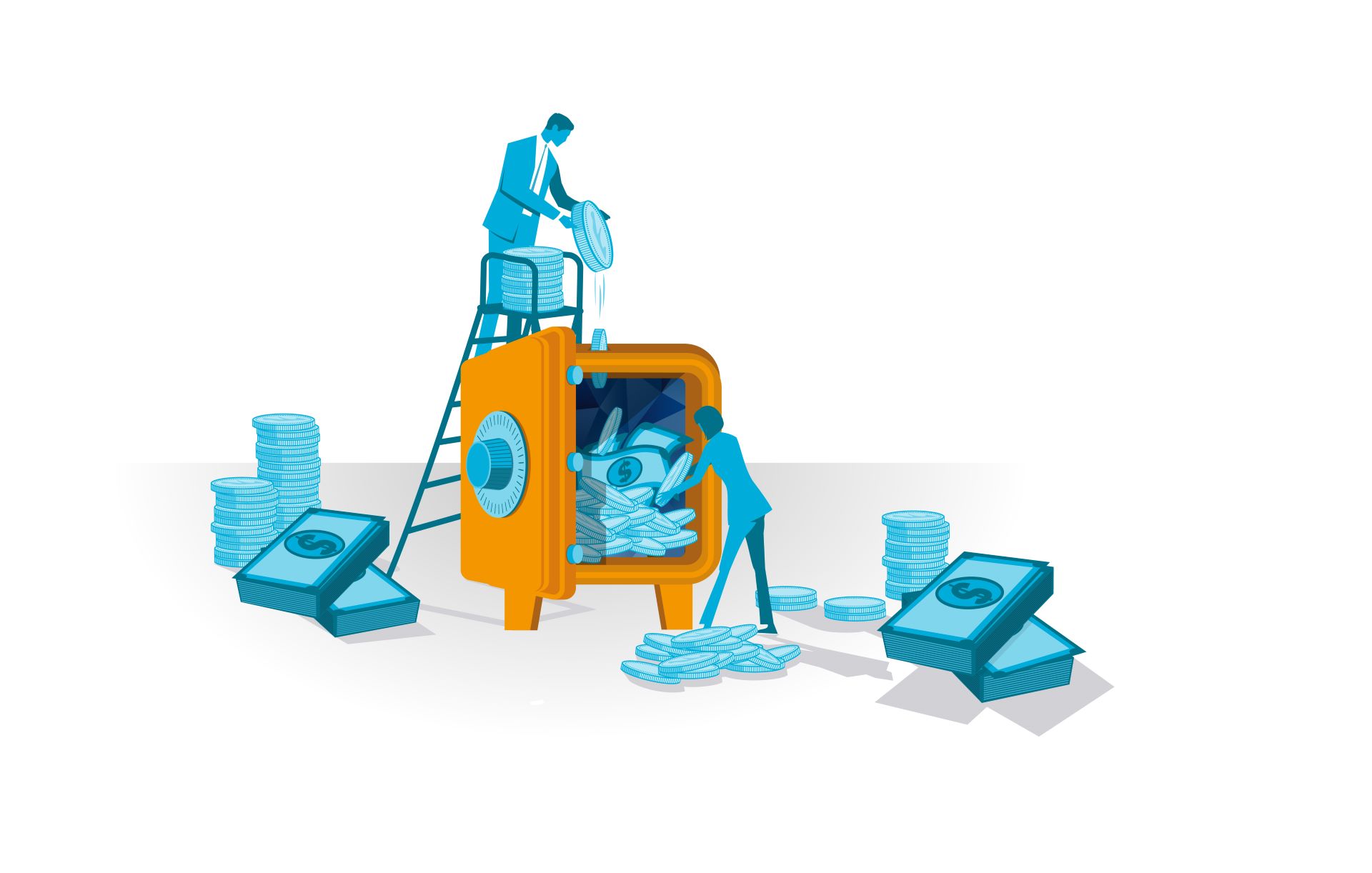How much cash should I have in my portfolio?
Put your cash to work and leverage this highly liquid asset class to your strategic advantage.

Due to its lower return potential, the role of cash and cash-equivalent investments can be easily undervalued by investors. However, this asset class plays a critical — and practical — function in a well-rounded portfolio. It can help you meet short-term liquidity needs, offer more stability during periods of market volatility and provide a degree of risk management.
An Ameriprise financial advisor can help you determine how much cash to allocate in your portfolio and which type of cash investments are appropriate based on your unique circumstances, risk tolerance and financial goals.
Here’s a look at cash investments, their advantages and disadvantages, and the strategic role they can play in your portfolio:
Types of cash investments
In financial planning terms, cash isn’t just hard currency. Instead, it’s a term that is broadly used to describe safe, liquid holdings that are often low in risk and provide a relatively low yield compared to other, longer-term investments. There are many different types of cash and cash-equivalent investments available, each with unique characteristics. Some of the most common include:
- Savings accounts: These interest-bearing deposit accounts are typically offered through banks or credit unions, are designed for long-term saving and are insured by the Federal Deposit Insurance Corporation (FDIC),1 which is a U.S. federal government agency. But there may be a limit on how often you can withdraw money without incurring a fee.
- Checking accounts: These FDIC-insured accounts,1 typically held at a bank or credit union, are designed to facilitate short-term spending and cash flow management. Most people use checking accounts to pay regular bills and for their paycheck direct deposit needs. However, these accounts typically earn little to no interest, meaning you wouldn’t want to keep large sums of cash in this account due to inflationary risk.
- High-interest savings accounts and money market accounts: Offered by banks and credit unions, these accounts typically offer higher interest rates than traditional savings and checking accounts, though you may be required to keep a minimum balance. High-interest savings accounts and money market accounts are also lower risk, as both are insured by the FDIC up to $250,000 per institution, per depositor.1
- Certificates of deposit (CDs): With a CD, an investor agrees to deposit a sum of money for a fixed time period (ranging up to several years) in exchange for a higher interest rate than a traditional savings account. Offered by banks and credit unions and insured by the FDIC, CDs are often considered cash investments.1
- Face-amount certificates: These are securities subject to regulation under federal and state securities laws. Similar to CDs, these certificates generate interest and dividends, but they are not backed by FDIC insurance1 because they are often backed by the issuer. The investor agrees to deposit a sum of money for a fixed time period in exchange for a higher interest rate than a traditional savings or checking account.
- Treasury bills: These short-term debt obligations are backed by the U.S. government and have a maturity that can range from only a few days to one year. Since they’re considered a low-risk investment, interest earned can sometimes be lower compared to the overall market.
- Money market funds: Money market funds are a type of mutual fund that invests in highly liquid, high-quality cash instruments, and they can offer higher yields than savings or checking accounts. As they are offered by brokerages, money market funds are not insured by the FDIC.
Learn more: 3 tips for short-term investing
Pros and cons of cash and cash-equivalent investments
As with any investment, cash investments have their advantages and disadvantages, and it is important to understand their benefits and drawbacks when deciding how to make these investments work for you:
| Pros | Cons |
|---|---|
|
|
Learn more: How to determine risk tolerance for investing
How much cash should I have in my portfolio?
How much cash you should hold in your portfolio depends on a range of factors, such as the number of short-term financial goals you have, your risk tolerance, how large of a cash reserve you feel comfortable with and how close you are to retirement. For example, retirees generally may want to keep a larger cash allocation to insulate them from the possibility of a market downturn. If you are saving for multiple short-term financial goals — such as a large purchase, a wedding or home downpayment — then you may have a higher allocation of cash investments in your portfolio since you’ll soon need access to those funds.
Learn more: Establishing a cash reserve: How much should you have?
| Time horizon | Goals and liquidity needs | Solutions to consider |
|---|---|---|
| Immediate | Immediate cash needs; daily expenses | Checking accounts; savings accounts |
| Less than a month | Preservation of principal; access to funds in case of emergency or unexpected expenses | Checking accounts; savings accounts |
| 1–3 months | Preservation of principal with enhanced yields; near-term (but not immediate) cash needs | Money market funds |
| 3–12 months | Growth of principal; intermediate liquidity needs; management of large purchase or expense | Laddered certificates or CDs; laddered Treasury bills; high-yield savings accounts |
| 12–36 months | Longer-term cash reserve growth; longer-term cash needs; management of large purchase or expense |
Laddered certificates or CDs; laddered Treasury bills; high-interest savings accounts; money market accounts |
One of your clients has some questions they would like to discuss with you at your next meeting.
warning Something went wrong. Do you want to try reloading? Try again
When you’re ready to reach out to an Ameriprise financial advisor for a complimentary initial consultation, consider bringing these questions to your meeting.
Or, request an appointment online to speak with an advisor.
At Ameriprise, the financial advice we give each of our clients is personalized, based on your goals and no one else's.
If you know someone who could benefit from a conversation, please refer me.
Background and qualification information is available at FINRA's BrokerCheck website.

